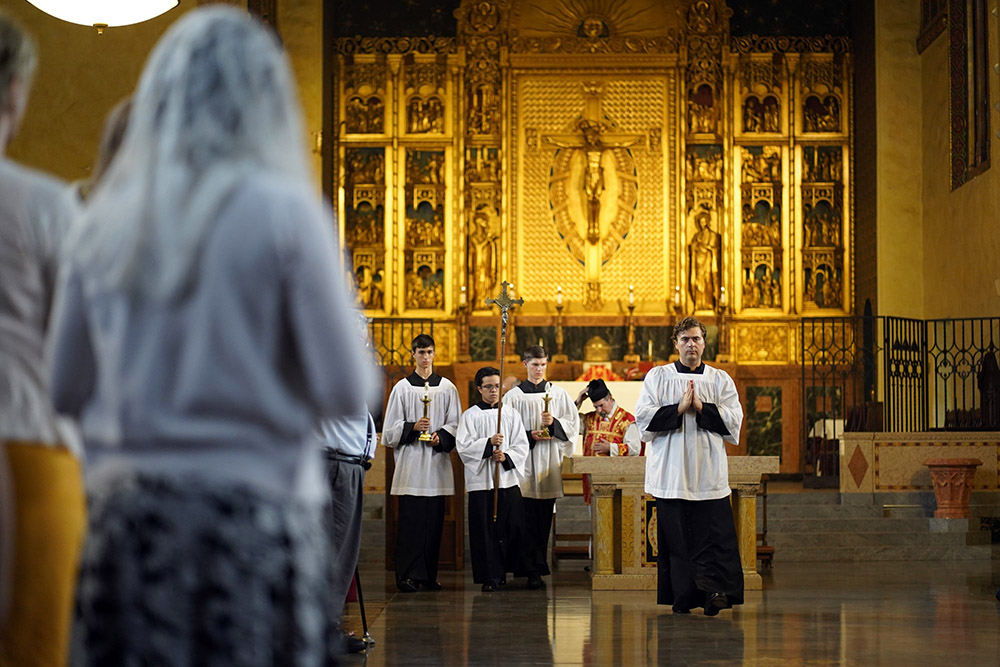
Altar servers lead the closing procession during a Tridentine Mass at Immaculate Conception Seminary in Huntington, New York, on July 1, 2021. (CNS/Gregory A. Shemitz)
The implementation of Traditionis Custodes, the motu proprio from Pope Francis that limited the celebration of the pre-Vatican II Latin liturgy or "extraordinary form," should not be so hard, should it? As I wrote at the time, the liberalization of access to the old rite that Pope Benedict XVI had granted in 2007 had become a movement, even an ideology, in which the legitimacy of the Second Vatican Council was increasingly questioned.
In an interview with NCR and The Tablet last year, Cardinal Arthur Roche, prefect of the Dicastery for Divine Worship and the Sacraments, explained the larger ecclesiological issues at stake.
"After two world wars which had been initiated in the heart of Christian Europe, it was obvious that there needed to be an enormous reform within the church," Roche said. "That reform is taking place, but it's a slow process because there are those who are dragging their feet with regard to this and not only dragging their feet but stubbornly opposing what the church has actually decreed. That's a very serious matter. In the end, people have to ask themselves: Am I really a Catholic, or am I more of a Protestant?"
While only a sliver of the Catholic population ever attends the old rite, despite all the ink spilt on the topic, those who do were trying to recruit others into quasi-schismatic ways of thinking, and the pope wanted to limit the spread of this movement.
Put differently, the pope, exercising his role as supreme legislator for the church, made it clear he wants to put the "extraordinary" back in the "extraordinary form."
As reported last week here at NCR, some U.S. bishops did not take the hint and arrogated to themselves the right to ignore the pope's wishes. Archbishop Samuel Aquila of Denver, Archbishop Alexander Sample of Portland, Oregon, and Bishop Thomas Paprocki of Springfield, Illinois, were among those invoking Canon 87 to claim the authority to dispense from the clear stipulation in Traditionis Custodes that celebrations of the old rite not take place at parish churches. Bishop Thomas Olmsted of Phoenix allowed seven parish churches to continue celebrating the old rite.
The fact that Paprocki was among those misreading canon law is interesting, seeing as he is the incoming chair of the U.S. bishops' Committee on Canonical Affairs and Church Governance. Oops.
Advertisement
Last week, the Vatican, for the third time, had to reiterate what it had already said. The rescript explicitly states: "Furthermore, the Holy Father confirms — having already expressed his assent in the audience of 18 November 2021 — what was established in the Responsa ad dubia with the annexed Explanatory Notes of 4 December 2021."
Roma locuta est. Let's hope the kids in the back of the room who were playing spitball and not paying attention will finally get the message.
There was one comic, perhaps tragicomic, journalistic aspect to this whole brouhaha. Our friends at The Pillar seem to think that they provoked this latest rescript. "I am flummoxed, I must admit, or humbled, to see that an analysis I wrote sits on a direct trajectory that led to a change in the universal law of the Church," wrote editor J.D. Flynn. "That doesn't happen every day."
Guess what? It didn't happen last week either. The Vatican was repeating what it had already said, not changing the universal law of the church. It is regrettable that the Holy See is forced at times to play canonical whack-a-mole with the critics of Francis, but there it is.
A much keener analysis was given by Where Peter Is, where Mike Lewis wrote:
Contrary to the arguments put forth by many papal critics, the document confirms that the authority of the [Dicastery for Divine Worship and the Discipline of the Sacraments] regarding these matters was "stipulated in Article 7 of Motu proprio Traditionis custodes." This is in line with the statements of Cardinal Roche in his Responsa ad Dubia of December 21, 2021, as well as multiple letters from his dicastery to individual bishops. It reasserts that the [dicastery] "exercises the authority of the Holy See in the above-mentioned cases, supervising the observance of the provisions."
Lewis also gets high marks for earlier securing a Feb. 17 statement from Roche about this matter. "It is an absurdity to think that the prefect of a dicastery would do anything other than exercise the wishes of the Holy Father as clearly outlined in their mandate and the General Norms of Praedicate Evangelium," Roche said. "The article in the Pillar is not really an attack on me but on the Pope's authority which for Catholics is an astonishing act full of hubris."
I am not a canon lawyer, but if I ever need an annulment, I don't think I would hire one of the canonists running The Pillar to handle my case.
This coming Dec. 4 will mark the 60th anniversary of the promulgation of Sacrosanctum Concilium, the Constitution on the Sacred Liturgy, which was the first major document approved by the council fathers at Vatican II. It is time, it is past time, for everybody who is interested in remaining Catholic to receive the conciliar liturgical reforms.
Editor's note: Due to a technical glitch that has now been resolved, some readers who signed up for Michael Sean Winters' newsletter did not receive it. If you would like to sign up again, please click this link. And be sure to forward the link to friends or family who might also be interested in signing up.





